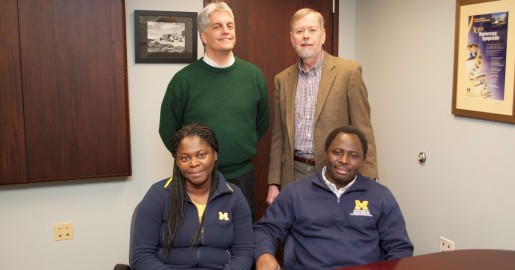03/23/2017 09:00 AM EDT

About a year ago, Tom Glover began sifting through a stack of applications from prospective students hoping to be admitted into the Master’s Degree Program in Human Genetics at the University of Michigan, Ann Arbor. Glover, the program’s director, got about halfway through the stack when he noticed applications from two physicians in West Africa: […]
H3Africa: Fostering Collaboration

Caption: Pioneers in building Africa’s genomic research capacity; front, Charlotte Osafo (l) and Yemi Raji; back, David Burke (l) and Tom Glover.
Credit: University of Michigan, Ann Arbor
Credit: University of Michigan, Ann Arbor
About a year ago, Tom Glover began sifting through a stack of applications from prospective students hoping to be admitted into the Master’s Degree Program in Human Genetics at the University of Michigan, Ann Arbor. Glover, the program’s director, got about halfway through the stack when he noticed applications from two physicians in West Africa: Charlotte Osafo from Ghana, and Yemi Raji from Nigeria. Both were kidney specialists in their 40s, and neither had formal training in genomics or molecular biology, which are normally requirements for entry into the program.
Glover’s first instinct was to disregard the applications. But he noticed the doctors were affiliated with the Human Heredity and Health in Africa (H3Africa) Initiative, which is co-supported by the Wellcome Trust and the National Institutes of Health Common Fund, and aims in part to build the expertise to carry out genomics research across the continent of Africa. (I am proud to have had a personal hand in the initial steps that led to the founding of H3Africa.) Glover held onto the two applications and, after much internal discussion, Osafo and Raji were admitted to the Master’s Program. But there were important stipulations: they had to arrive early to undergo “boot camp” in genomics and molecular biology and also extend their coursework over an extra term.
Both agreed and were soon put through the paces of performing basic lab techniques, hearing about the latest in DNA sequencing, learning the basics of designing genomic studies, and immersing themselves in their courses. Everything went well, but Glover still wondered whether they would survive even the first semester of a grueling one-year program that requires master’s students take the same advanced curriculum as Ph.D. candidates.
Glover soon learned never to underestimate Osafo and Raji. Both passed their first semester with flying colors, and Glover calls them an inspiration to their fellow students and faculty. Glover says he hopes to enroll more West Africans in the future.
Osafo and Raji are also no strangers to academia. Osafo is on the faculty at the University of Ghana, Accra, as is Raji at Nigeria’s University of Ibaban. They also serve as co-principal investigators in the H3Africa’s Kidney Disease Research Network. In this capacity, they have been active for several years working on awareness and medical outreach programs, helping coordinate the research network in their home countries, recruiting participants for the various research cohorts, and conducting epidemiological studies.
But with no formal training in genomics or molecular biology, they’ve had to step back for a year from joining the international hunt for genes that may influence the risk of chronic kidney disease. For two physicians who have dedicated their careers to reducing the high rate of chronic kidney disease in West Africa, that’s been tough. Chronic kidney disease affects an estimated 14 percent of people living in sub-Saharan Africa, which is comparable to the United States, but the rates are higher in rural regions [1]. West Africans also tend to develop advanced kidney disease in their 40s, about 20 years earlier than in Western countries.
At an H3Africa meeting last year, Osafo expressed her wish to take part in genomic research to her U.S. collaborator David Burke, a researcher at the University of Michigan. With opportunities for advanced scientific training extremely scarce in West Africa, Burke suggested that they look for a program overseas. They selected Michigan.
Since arriving in Ann Arbor, Osafo and Raji have embraced their educational opportunities with an extreme curiosity and desire to learn that has floored Glover. He notes that one thing that initially caught his eye about their applications was a promise that both made: if accepted into the program, they would return to their homelands to train others in the latest advances in genetics and genomics.
“We must say that being here in Michigan has been great,” said Osafo. “Everybody is trying to help us be successful.”
“There are a lot of other people like us within the project who are looking to take hold of this kind of opportunity,” Raji added.
With one semester to go, Osafo and Raji are halfway there. Glover encourages other graduate programs in human genetics to consider taking a chance on training an African researcher who might be a bit light on formal academic credentials, but strong in the desire to learn. It promises not only to be a win for the health of Africa, but for scientific creativity in America.
Reference:
[1] Human Heredity and Health (H3) in Africa Kidney Disease Research Network: A Focus on Methods in Sub-Saharan Africa. Osafo C, Raji YR, Burke D3, Tayo BO, Tiffin N, Moxey-Mims MM6, Rasooly RS,, Kimmel PL, Ojo A, Adu D, Parekh RS; H3Africa Kidney Disease Research Network Investigators as members of The H3Africa Consortium. Clin J Am Soc Nephrol. 2015 Dec 7;10(12):2279-2287
Links:
Kidney Disease (National Institute of Diabetes and Digestive and Kidney Diseases/NIH)
Thomas Glover (University of Michigan, Ann Arbor)






















.png)









No hay comentarios:
Publicar un comentario